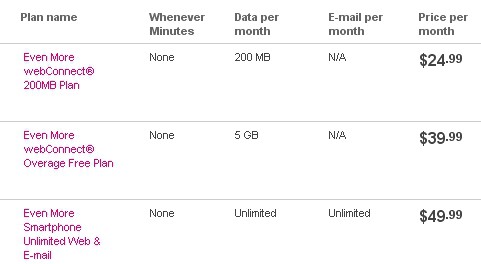Last year I participated in an online focus group about wireless broadband pricing. The subject was consumption billing vs. usage limits — do consumers value unlimited broadband plans with overlimit fees more than strict usage caps that cause speeds to plummet for customers who reach them. Also under consideration were various usage allowances sold at different price points. Focus group members could rate the plans’ acceptability from a scale of “extremely interested” to “would not consider this plan.” It took me mere minutes to work my way through dozens of combinations, rating them all unacceptable. Participants were next directed into an online forum to discuss the different plans amongst ourselves, with a moderator focusing and encouraging discussions.
Inevitably, I was asked why I rated every plan on offer as not worthy of my consideration. My short answer was that while I understand wireless was not presently a limitless resource, the plans suggested all included overlimit fees or plan allowances that would-be customers had to choose, many with no insight into what their monthly usage could or would be. Not on offer was a true consumption plan that charged wireless customers only for what they used during a month. If they didn’t use it at all, no bill would result. My bottom line — customers should not have to take a crash course in data consumption to predict their usage or face steep penalties when they guessed wrong.
T-Mobile has found a third way, although Cricket’s wireless broadband service beat them to it well over a year ago.
The company’s new 5GB wireless broadband plan offers a traditional usage cap every mobile broadband customer is familiar with, but imposes no overlimit fees on customers that exceed it. Instead, they reserve the right to dramatically reduce your speed until the next billing cycle begins. T-Mobile representatives tell Stop the Cap! the company won’t automatically impose the speed throttle unless customers have a history of regularly exceeding their usage allowance (or dramatically exceed it.) T-Mobile also may forgive a customer for an occasional breach, dropping the speed throttle for those who contact customer service and ask.
This effectively matches Cricket’s pricing and usage plan, which may cause that carrier to consider increasing usage allowances or reducing the price to compete.
Broadband Reports notes that the 200 megabyte plan still requires overlimit fees, but they’ve been cut in half from 20 cents per megabyte to 10 cents.
Larger carriers like AT&T and Verizon still impose overlimit fees on their usage-capped wireless broadband accounts. Cricket sells a $50 10 gigabyte usage allowance plan through Wal-Mart as well.


 Subscribe
Subscribe


Sprint – via Virgin Mobile – has had pay-as-you-go mobile broadband for almost a year now. I was one of the first subscribers. Recently, they increased the data you get for your money. It’s a great value. If we had real competition, maybe we’d have innovative this for residential broadband.
Just one question. when if I’ve reached the overlimit of the usage, how much slow would the speed be reduced?